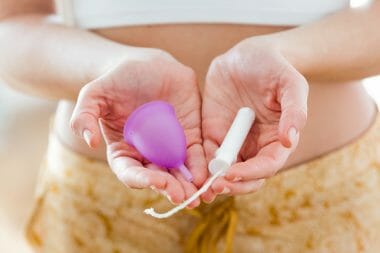When you make the decision to become pregnant, it is a time that is filled with excitement, joy, nervousness, and wonder. Maybe you and your partner have decided to wait a specific amount of time before deciding to start a family. Having an adequate income, a nice home, proper childcare , and other important decisions factor into having children. Not to say that surprise little bundles of joy are not just as fantastic and well-loved and cared for, but for many couples, planning takes away some of the anxiety that can happen when a woman becomes pregnant.
For women who have decided to wait a certain amount of time, especially if that amount of time put her over the age of 35, sometimes becoming pregnant is difficult. It is said that after the age of 35, a woman’s chances of conceiving are greatly reduced because she is not producing as many eggs as she did when she was younger. Now, 35 is definitely not old by any stretch of the imagination; however, in terms of pregnancy and how it relates to a woman’s likelihood of being able to produce healthy eggs, 35 seems to be the magic number for considering women to be “advanced maternal age.”
It is important to point out that younger women sometimes have difficulty getting pregnant, too. Polycystic ovarian syndrome, or PCOS is a condition which affects a woman’s menstrual cycle. Women with PCOS have high levels of male hormones. Irregular and/or missed periods, and multiple tiny cysts on one or both of their ovaries. PCOS also affects a woman’s appearance with dark patches of skin, unwanted hair growth, and weight gain that is quite prominent in the midsection. Primary ovarian insufficiency is another condition that can make it difficult for a younger woman to become pregnant. Primary ovarian insufficiency (POI) causes a woman’s ovaries to stop producing eggs normally before age 40. Primary insufficiency should not be confused with early menopause. With POI, a woman may still have periods sporadically, but difficulties with ovulating make getting pregnant harder with this condition.
Another important factor to consider if there is difficulty with becoming pregnant is the male’s sperm. Conventional thinking leads many to believe that if there are problems with fertility that the female should be the only focus. The next time you are watching a television program with a doctor or a group of doctors discussing infertility, you will more than likely find that they have, indeed, focused on the woman’s health issues or her age. For many men, health issues, smoking, chemotherapy and radiation for cancer can affect the health of sperm. A man’s age as it relates to the amount of healthy sperm he produces is not discussed as much as a woman’s age and how it relates to her producing healthy eggs.
Now that we have talked about the various reasons why a woman may not be able to conceive naturally, we will discuss what she can do to become pregnant. Freezing eggs for use at a future date is a viable and popular option for women who are opting to delay pregnancy until later or for couples who are facing difficulty with natural conception.
What Is Freezing Eggs For Use With In Vitro Fertilization?
In brief, egg freezing for use with in vitro fertilization is when a woman has her eggs extracted, frozen and stored until she decides to have them removed, fertilized and implanted at a future time. This process is also referred to as fertility preservation.
Who Is A Good Candidate For Egg Freezing With In Vitro Fertilization?
Fertility preservation is an excellent choice for women who are in their childbearing years. The general age range for this type of procedure is between the ages of 22 to 38. The thought process is that the younger a woman is when she has her eggs frozen, the healthier the eggs will be, thus resulting in a healthy baby. However, women over the age of 38 have been successful with this procedure as well. Though controversial, women over the age of 50 have also seen success with fertility preservation.
Using An Ovulation Calculator
Before you decide whether or not IVF treatment is something that you would like to pursue, perhaps using an ovulation calculator would be a place to start. Ovulation times vary from woman to woman, so you would need to determine your most fertile times. An ovulation calendar like the one here can help you to figure out which days you are more likely to conceive. Signs of ovulation for many women start 2 to 3 days before their menstrual cycle. Cramping is a sign of ovulation for many. Thinner cervical secretions are also a good sign that you have a greater chance of getting pregnant. Knowing what signs to check for and using an ovulation calculator can potentially increase your chances of getting pregnant.
However, if you are someone who has anovulation, which means you do not ovulate, you would need to see your physician to determine what is causing you not to ovulate.
Exactly What Is Egg Freezing?
The process of freezing your eggs for later use is really quite straightforward. You will see a specialist who will extract your eggs. The eggs are then frozen until you decide to use them. The technology in freezing eggs for IVF has advanced, however. Egg freezing, or vitrification, is the process by which eggs are flash frozen. This simply means that once the eggs are in the vial, the vial is then placed in a solution that rapidly freezes them. Since eggs have a high water content, previously performed techniques for egg freezing caused them to develop ice crystals. The ice crystals caused fragility in the eggs, thereby making them more susceptible to fracture. Vitrification freezes the eggs rapidly, eliminating the concern for ice crystal formation.
Who Performs This Type of Procedure?
Once you have made the decision to go forward with freezing your eggs, you want to be assured that you are being treated by a physician who is well-trained and board certified. In order to do that you will want to see a physician who specializes in reproductive endocrinology and infertility, as well as gynecology and obstetrics.
What Happens On My Consultation Visit?
During your first appointment with your physician, he or she will go over your basic health information. You will be asked if you have any health issues that may be contributing to your fertility issues. If fertility issues are not the case for you, and your goal is to freeze your eggs for future use, you and your doctor will discuss the process for egg freezing. Your physician will discuss with you what types of tests will need to be performed prior to going ahead with the procedure.
Of note, if infertility is keeping you from getting pregnant, you will undergo a complete evaluation to determine the cause. Once your infertility examination is complete, you will be allowed access to a database of donors. The frozen donor eggs will be shipped to an infertility center and stored there until you are ready to use them.
What Do You Need To Do Prior To Egg Freezing?
Your uterus will need to be prepped or matured prior to transferring them to you. You will be given estrogen to take orally as well as testosterone to be given by way of shots or vaginally. When your uterus is ready, the eggs are thawed and fertilized with sperm. After that, the embryos are cultured for up to 5 days, following which they are then transferred to your uterus.
How Are the Eggs Un-Frozen?
ICSI or intracytoplasmic sperm injection is the procedure used to fertilize frozen eggs. It is strongly advised that ICSI be used. Studies have shown that the outer layer of the eggs become hardened during the freezing process. ICSI improves fertilization and success rates. After the embryos have been cultured for about 5 days, they are ready for transfer into your uterus.
Success Rates With Frozen Egg Treatment
The rate of success with egg freezing/ICSI depends on some very key factors: the age of the woman at which time the eggs were frozen, the experience of the center performing the procedure, the quality of the eggs at the time of vitrification, and the quality of the sperm at the time of fertilization. To determine how you would fair with this procedure, it is recommended that you make an appointment with your physician.







Reply